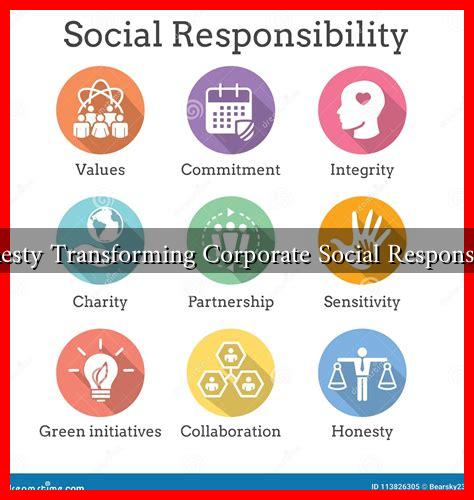-
Table of Contents
Is Honesty Transforming Corporate Social Responsibility?
In recent years, the landscape of Corporate Social Responsibility (CSR) has undergone significant changes, driven largely by a growing demand for transparency and honesty from consumers, investors, and stakeholders. As businesses navigate this evolving terrain, the question arises: is honesty truly transforming CSR? This article explores the intersection of honesty and CSR, examining how transparency is reshaping corporate practices and consumer expectations.
The Shift Towards Transparency
Historically, CSR initiatives were often viewed as mere marketing tools, with companies engaging in philanthropic activities to enhance their public image. However, the rise of social media and increased access to information have shifted this paradigm. Consumers are now more informed and skeptical, demanding genuine commitment to social and environmental issues. This shift has led to a new focus on honesty in CSR practices.
Why Honesty Matters in CSR
Honesty in CSR is crucial for several reasons:
- Building Trust: Transparency fosters trust between companies and their stakeholders. When businesses are honest about their practices, consumers are more likely to support them.
- Enhancing Reputation: Companies that prioritize honesty in their CSR efforts often enjoy a better reputation, which can lead to increased customer loyalty and brand equity.
- Attracting Investment: Investors are increasingly looking for companies that demonstrate ethical practices. Honest CSR initiatives can attract socially responsible investors.
- Mitigating Risks: By being transparent about their operations and impacts, companies can identify and address potential risks before they escalate into crises.
Case Studies of Honesty in CSR
Several companies have successfully integrated honesty into their CSR strategies, setting examples for others to follow:
1. Patagonia
Patagonia, the outdoor clothing brand, is renowned for its commitment to environmental sustainability. The company openly shares its supply chain practices, including the challenges it faces in sourcing materials responsibly. Patagonia’s “Don’t Buy This Jacket” campaign encouraged consumers to think critically about consumption, showcasing the brand’s dedication to honesty and environmental stewardship.
2. Unilever
Unilever has made significant strides in its Sustainable Living Plan, which aims to reduce the company’s environmental footprint while increasing its positive social impact. The company publishes detailed reports on its progress, including both successes and setbacks. This level of transparency has helped Unilever build credibility and trust with consumers and investors alike.
3. Ben & Jerry’s
Ben & Jerry’s is another example of a company that embraces honesty in its CSR efforts. The ice cream brand is vocal about its social justice initiatives and environmental commitments. By openly discussing its challenges and advocating for systemic change, Ben & Jerry’s has cultivated a loyal customer base that appreciates its authenticity.
The Role of Technology in Promoting Honesty
Technology plays a pivotal role in enhancing transparency in CSR. Companies are leveraging digital platforms to communicate their CSR efforts more effectively. Some key technological advancements include:
- Blockchain: This technology can provide an immutable record of a company’s supply chain, ensuring that claims about ethical sourcing are verifiable.
- Social Media: Platforms like Twitter and Instagram allow companies to share real-time updates about their CSR initiatives, fostering direct communication with consumers.
- Data Analytics: Companies can use data analytics to measure the impact of their CSR efforts, providing stakeholders with concrete evidence of their commitments.
Challenges to Honesty in CSR
Despite the positive trends, challenges remain in achieving honesty in CSR:
- Greenwashing: Some companies engage in misleading marketing practices, presenting themselves as more environmentally friendly than they are.
- Lack of Standardization: The absence of universally accepted standards for CSR reporting can lead to inconsistencies and confusion among consumers.
- Resistance to Change: Some organizations may resist adopting transparent practices due to fear of negative publicity or backlash.
Conclusion
Honesty is indeed transforming Corporate Social Responsibility, as companies recognize the importance of transparency in building trust and credibility with stakeholders. The examples of Patagonia, Unilever, and Ben & Jerry’s illustrate how genuine commitment to ethical practices can lead to positive outcomes for both businesses and society. While challenges remain, the integration of technology and a growing consumer demand for accountability are paving the way for a more honest approach to CSR. As businesses continue to evolve, embracing honesty will be essential for long-term success and sustainability.
For further reading on the impact of honesty in corporate practices, you can explore resources from the CSRwire.

